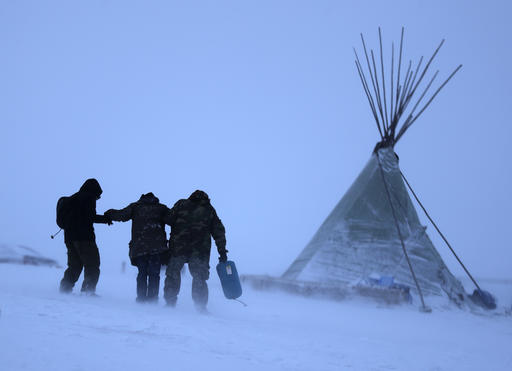BISMARCK, N.D. (AP) — A federal court battle over whether the developer of the Dakota Access oil pipeline can finish the $3.8 billion project will linger at least into the first couple months of the new year.
Texas-based Energy Transfer Partners last month asked U.S. District Judge James Boasberg to declare it can legally lay pipe under a Missouri River reservoir in North Dakota — the last remaining large chunk of construction on the 1,200-mile, four-state pipeline to move North Dakota oil to a shipping point in Illinois.
The Army has declined to give permission due to opposition by the Standing Rock Sioux and Cheyenne River Sioux, who fear any leaks would contaminate drinking water. The Army cites a need for more study of the Lake Oahe crossing and consideration of alternative routes.
ETP believes it already has the necessary permission and has asked Boasberg to concur. Company lawyers earlier proposed a schedule that included an early January hearing. Boasberg on Friday gave the government until Jan. 6 to file its opposition to ETP’s request for permission. Boasberg won’t hear arguments until at least February.
The two tribes filed documents Wednesday saying they are willing to put their claims on hold while the Army Corps of Engineers does more study. The tribes earlier this year challenged the government’s decision to grant permits at more than 200 water crossings.
“Plaintiff tribes applaud the decision by the Corps and intend to work in good faith with the Corps through the (study) process in hopes that a resolution of its concerns can be achieved without the need for further proceedings in this court,” attorneys wrote.
The tribes also intend to oppose ETP’s request to the judge for permission to drill under the lake. Boasberg also gave them until Jan. 6 to do so.
Tribal members and supporters have been protesting the pipeline for months, based at a camp near the pipeline route in southern North Dakota. Harsh wintry weather is beginning to drive some people out of the camp.
The Morton County Sheriff’s Office estimated Friday that between 1,800 and 2,200 people remain in the camp on federal land, spokesman Rob Keller said. That’s down from estimates of 3,000 to 5,000 people before heavy snow and bitter cold settled in.
Tribal Chairman Dave Archambault this week called for the camp to disband, though Native American rights activist Chase Iron Eyes implored protesters to stay.
A coalition of grassroots groups opposing the pipeline issued a statement Friday saying they support a transition to protesting against project investors in communities. However, they said they also support pipeline opponents who choose to stay in camp overwinter.
The groups included the Indigenous Environmental Network, Honor the Earth, Sacred Stone Camp and the International Indigenous Youth Council.
___
Follow Blake Nicholson on Twitter at: http://twitter.com/NicholsonBlake
Copyright 2016 The Associated Press. All rights reserved. This material may not be published, broadcast, rewritten or redistributed.






